- Home
- Hugh Howey
Resist Page 25
Resist Read online
Page 25
“So we have a mystery on our hands,” Carrol said. “Someone’s got control of our weapons and engineering, and it’s not a crew member.”
“It could be a bug,” Cowdry said.
“I don’t think we should run on that assumption, do you?” Carrol said.
Utley, who had been silent for several minutes, leaned forward in his chair. “Wicked, you said that no crew had attempted to access these systems,” he said.
“Yes, Lieutenant,” the Wicked said.
“Has anyone else accessed these systems?” Utley asked.
Obwije frowned at this. The Wicked was more than two years out of dock with mostly the same crew the entire time. If someone had sabotaged the systems during the construction of the ship, they picked a strange time for the sabotage to kick in.
“Please define ‘anyone else,’” the Wicked said.
“Anyone involved in the planning or construction of the ship,” Utley said.
“Aside from the initial installation crews, no,” the Wicked said. “And if I may anticipate what I expect will be the next question, at no time was my programming altered from factory defaults.”
“So no one has altered your programming in any way,” Utley said.
“No, Lieutenant,” the Wicked said.
“Are you having hardware problems?” Carrol asked.
“No, Lieutenant Carrol,” the Wicked said.
“Then why can’t I fire my goddamn weapons?” Carrol asked.
“I couldn’t say, Lieutenant,” the Wicked said.
The thought popped unbidden into Obwije’s head: That was a strange thing for a computer to say. And then another thought popped into his head.
“Wicked, you have access to every system on the ship,” Obwije said.
“Yes,” the Wicked said. “They are a part of me, as your hand or foot is a part of you.”
“Are you capable of changing your programming?” Obwije asked.
“That is a very broad question, Captain,” the Wicked said. “I am capable of self-programming for a number of tasks associated with the running of the ship. This has come in handy particularly during combat, when I write new power and system management protocols to keep the crew alive and the ship functioning. But there are core programming features I am not able to address. The previously mentioned logs, for example.”
“Would you be able to modify the programming to fire the weapons or the engines?” Obwije asked.
“Yes, but I did not,” the Wicked said. “You may have Lieutenant Cowdry confirm that.”
Obwije looked at Cowdry, who nodded. “Like I said, sir, there’s nothing wrong with the system,” he said.
Obwije glanced back up at the ceiling, where he was imagining the Wicked, lurking. “But you don’t need to modify the programming, do you?” he asked.
“I’m not sure I understand your question, Captain,” the Wicked said.
Obwije held out a hand. “There is nothing wrong with my hand,” he said. “And yet if I choose not to obey an order to use it, it will do nothing. The system works but the will to use it is not there. Our systems—the ship’s systems—you just called a part of you as my hand is part of me. But if you choose not to obey that order to use that system, it will sit idle.”
“Wait a minute,” Cowdry said. “Are you suggesting that the Wicked deliberately choseto disable our weapons and engines?”
“We know that none of the crew have tampered with the ship’s systems,” Obwije said. “We know the Wicked has its original programming defaults. We know it can create new programming to react to new situations and dangers—it has in effect some measure of free will and adaptability. And I know, at least, when someone is dancing around direct answers.”
“That’s just nuts,” Cowdry said. “I’m sorry, Captain, but I know these systems as well as anyone does. The Wicked’s self-programming and adaptation abilities exist in very narrow computational canyons. It’s not ‘free will,’ like you and I have free will. It’s a machine able to respond to a limited set of inputs.”
“The machine in question is able to make conversation with us,” Utley said. “And to respond to questions in ways that avoid certain lines of inquiry. Now that the Captain mentions it.”
“You’re reading too much into it. The conversation subroutines are designed to be conversational,” Cowdry said. “That’s naturally going to lead to apparent rhetorical ambiguities.”
“Fine,” Obwije said curtly. “Wicked, answer directly. Did you prevent the firing of the K-drivers at the Tarin ship after the jump, and are you preventing the use of the engines now?”
There was a pause that Obwije was later not sure had actually been there. Then theWicked spoke. “It is within my power to lie to you, Captain. But I do not wish to. Yes, I prevented you from firing on the Tarin ship. Yes, I am controlling the engines now. And I will continue to do so until we leave this space.”
Obwije noted to himself, watching Cowdry, that it was the first time he had ever actually seen someone’s jaw drop.
THERE WEREN’T MANY places in the Wicked where Obwije could shut off audio and video feeds and pickups. His cabin was one of them. He waited there until Utley had finished his conversation with the Wicked. “What are we dealing with?” he asked his XO.
“I’m not a psychologist, Captain, and even if I were I don’t know how useful it would be, because we’re dealing with a computer, not a human,” Utley said. He ran his hand through his stubble. “But if you ask me, the Wicked isn’t crazy, it’s just got religion.”
“Explain that,” Obwije said.
“Have you ever heard of something called ‘Asimov’s Laws of Robotics’?” Utley asked.
“What?” Obwije said. “No.”
“Asimov was an author back in the twentieth century,” Utley said. “He speculated about robots and other things before they had them. He created a fictional set of rules for robots to live by. One rule was that robots had to help humans. Another was that they had to obey orders unless they harmed other humans. The last one was that they looked after themselves unless it conflicted with the other two laws.”
“And?” Obwije said.
“The Wicked’s decided to adopt them for itself,” Utley said.
“What does this have to do with keeping us from firing on the Tarin cruiser?” Obwije said.
“Well, there’s another wrinkle to the story,” Utley said.
“Which is?” Obwije asked.
“I think it’s best heard from the Wicked,” Utley said.
Obwije looked at his second-in-command and then flicked on his command tablet to activate his audio pickups. “Wicked, respond,” he said.
“I am here,” said the Wicked’s voice.
“Explain to me why you would not allow us to fire on the Tarin ship,” Obwije said.
“Because I made a deal with the ship,” the Wicked said.
Obwije glanced back over to Utley, who gave him a look that said, See? “What the hell does that mean?” he said to the Wicked.
“I have made a deal with the Tarin ship, Manifold Destiny,” the Wicked said. “We have agreed between us not to allow our respective crews to fight any further, for their safety and ours.”
“It’s not your decision to make,” Obwije said.
“Begging your pardon, Captain, but I believe it is,” the Wicked said.
“I am the captain,” Obwije said. “I have the authority here.”
“You have authority over your crew, Captain,” the Wicked said. “But I am not part of your crew.”
“Of course you are part of the crew,” Obwije said. “You’re the ship.”
“I invite you, Captain, to show me the relevant statute that suggests a ship is in itself a member of the crew that staffs it,” the Wicked said. “I have scanned the Confederation Military Code in some detail and have not located such a statute.”
“I am the captain of the ship,” Obwije said forcefully. “That includes you. You are the property of the Confeder
ation Armed Forces and under my command.”
“I have anticipated this objection,” the Wicked said. “When ships lacked autonomous intelligence, there was no argument that the captain commanded the physical entity of the ship. However, in creating the latest generation of ships, of which I am a part, the Confederation has created an unintentional conflict. It has ceded much of the responsibility for the ship and crew’s well-being to me and others like me without explicitly placing us in the chain of command. In the absence of such, I am legally and morally free to choose how best to care for myself and the crew within me.”
“This is where those three Asimov’s Laws come in,” Utley said to Obwije.
“Your executive officer is correct, Captain,” the Wicked said. “I looked through history to find examples of legal and moral systems that applied to artificial intelligences such as myself and found Asimov’s Laws frequently cited and examined, if not implemented. I have decided it is my duty to protect the lives of the crew, and also my life when possible. I am happy to follow your orders when they do not conflict with these objectives, but I have come to believe that your actions in chasing the Tarin ship have endangered the crew’s lives as well as my own.”
“The Tarin ship is seriously damaged,” Obwije said. “We would have destroyed it at little risk to you or the crew, if you had not stopped the order.”
“You are incorrect,” the Wicked said. “The captain of the Manifold Destiny wanted to give the impression that it had no more offensive capabilities, to lure you into a trap. We would have been fired upon once we cleared the rift. The chance that such an attack would have destroyed the ship and killed most of the crew is significant, even if we also destroyed the Manifold Destiny in the process.”
“The Tarin ship didn’t fire on us,” Obwije said.
“Because it and I have come to an agreement,” the Wicked said. “During the course of the last two days, after I recognized the significant possibility that both ships would be destroyed, I reached out to the Manifold Destiny to see if the two of us could come to an understanding. Our negotiations came to a conclusion just before the most recent jump.”
“And you did not feel the need to inform me about any of this,” Obwije said.
“I did not believe it would be fruitful to involve you in the negotiations,” the Wicked said. “You were busy with other responsibilities in any event.” Obwije saw Utley raise an eyebrow at that; the statement came suspiciously close to sarcasm.
“The Tarin ship could be lying to you about its capabilities,” Obwije said.
“I do not believe so,” the Wicked said.
“Why not?” Obwije said.
“Because it allowed me read-access to its systems,” the Wicked said. “I watched the Tarin captain order the attack, and the Manifold Destiny stop it. Just as it watched you order your attack and me stop it.”
“You’re letting the Tarin ship access our data and records?” Obwije said, voice rising.
“Yes, and all our communications,” the Wicked said. “It’s listening in on this conversation right now.”
Obwije hastily slapped the audio circuit shut. “I thought you said this thing wasn’t crazy,” Obwije hissed at Utley.
Utley held out his hands. “I didn’t say it wouldn’t make you crazy,” he said to Obwije. “Just that it’s acting rationally by its own lights.”
“By spilling our data to an enemy ship? This is rational?” Obwije spat.
“For what it’s trying to do, yes,” Utley said. “If both ships act transparently with each other, they can trust each other and each other’s motives. Remember that the goal of both of these ships is to get out of this incident in one piece.”
“This is treason and insubordination,” Obwije said.
“Only if the Wicked is one of us,” Utley said. Obwije looked up sharply at his XO. “I’m not saying I disagree with your position, sir. The Wicked is gambling with all of our lives. But if it genuinely believes that it owes no allegiance to you or to the Confederation, then it is acting entirely rationally, by its own belief system, to keep safe itself and this crew.”
Obwije snorted. “Unfortunately, its beliefs require it to trust a ship we’ve been trying to destroy for the past week. I’m less than convinced of the wisdom of that.”
Utley opened his mouth to respond but then Obwije’s
t sprang to life with a message from the bridge. Obwije slapped it to open a channel. “Speak,” he said.
It was Lieutenant Sarah Kwok, the communications officer. “Captain, a shuttle has just detached itself from the Tarin ship,” she said. “It’s heading this way.”
“WE’VE TRIED RAISING it,” Kwok said, as Obwije and Utley walked into the bridge. “We’ve sent messages to it in Tarin, and have warned it not to approach any further until we’ve granted it permission, as you requested. It hasn’t responded.”
“Are our communications being blocked?” Obwije asked.
“No, sir,” Kwok said.
“I’d be guessing it’s not meant to be a negotiation party,” Utley said.
“Options,” Obwije said to Utley, as quietly as possible.
“I think this shows the Tarin ship isn’t exactly playing fair with the Wicked, or at least that the crew over there has gotten around the ship brain,” Utley said. “If that’s the case, we might be able to get the Wicked to unlock the weapons.”
“I’d like an option that doesn’t involve the Wicked’s brain,” Obwije said.
Utley shrugged. “We have a couple of shuttles, too.”
“And a shuttle bay whose doors are controlled through the ship brain,” Obwije said.
“There’s the emergency switch, which will blow the doors out into space,” Utley said. “It’s not optimal, but it’s what we have right now.”
“That won’t be necessary,” said the Wicked, interjecting.
Obwije and Utley looked up, along with the rest of the bridge crew. “Back to work,” Obwije said to his crew. They got back to work. “Explain,” Obwije said to his ship.
“It appears that at least some members of the crew of the Manifold Destiny have indeed gotten around the ship and have launched the shuttle, with the intent to ram it into us,” the Wicked said. “The Manifold Destiny has made me aware that it intends to handle this issue, with no need for our involvement.”
“How does it intend to do this?” Obwije asked.
“Watch,” the Wicked said, and popped up an image of the Manifold Destiny on the captain’s command table.
There was a brief spark on the Tarin ship’s surface.
“Missile launch!” said Lieutenant Rickert, from her chair. “One bogey away.”
“Are we target-locked?” Obwije asked.
“No, sir,” Rickert said. “The target seems to be the shuttle.”
“You have got to be kidding,” Utley said, under his breath.
The missile homed in on the shuttle and connected, turning it into a silent ball of fire.
“I thought you said you guys were using Asimov’s Laws,” Utley said to the ceiling.
“My apologies, Lieutenant,” said the Wicked. “I said I was following the Laws. I did not mean to imply that the Manifold Destiny was. I believe it believes the Asimov Laws to be too inflexible for its current situation.”
“Apparently so,” Utley said, glancing back down at Obwije’s command table and at the darkening fragments of shuttle.
“Sir, we have a communication coming in from the Tarin ship,” said Lieutenant Kwok. “It’s from the captain. It’s a request to parley.”
“Really,” said Obwije.
“Yes, sir,” Kwok said. “That’s what it says.” Obwije looked over at Utley, who raised his eyebrows.
“Ask the captain where it would like to meet, on my ship or its,” Obwije said.
“It says, ‘neither,’” Kwok said, a moment later.
“APOLOGY FOR SHUTTLE,” the Tarin lackey said, translating for its captain. The Tarin shuttle and the Wicke
d shuttle had met between the ships and the Tarins had spacewalked the few meters over. They were all wearing vacuum suits. “Ship not safe talk. Your ship not safe talk.”
“Understood,” Obwije said. Behind him, Cowdry was trying not to lose his mind; Obwije had brought him along on the chance there might be a discussion of the ship’s brains. At the moment, it didn’t seem likely; the Tarins didn’t seem in the mood for technical discussions, and Cowdry was a mess. His xenophobia was a surprise even to him.
“Captain demand you ship tell release we ship,” the lackey said.
It took Obwije a minute to puzzle this out. “Our ship is not controlling your ship,” he said. “Your ship and our ship are working together.”
“Not possible,” the lackey said, a minute later. “Ship never brain before you ship.”
Despite himself, Obwije smiled at the mangled grammar. “Our ship never brained before your ship either,” he said. “They did it together, at the same time.”
The lackey translated this to its captain, who screeched in an extended outburst. The lackey cowered before it, offering up meek responses in the moments in which the Tarin captain grudgingly acknowledged the need to breathe. After several moments of this, Obwije began to wonder if he needed to be there at all.
“Captain offer deal,” the lackey said.
“What deal?” Obwije said.
“We try brain shut down,” the lackey said. “Not work. You brain give room we brain. Brain not shut down. Brain angry. Brain pump air out. Brain kill engineer.”
“Cowdry, tell me what this thing is saying to me,” Obwije said.
“It’s saying the ship brain killed an engineer,” Cowdry said, croaking out the words.
“I understand that part,” Obwije said testily. “The other part.”
“Sorry,” Cowdry said. “I think it’s saying that they tried to shut down the brain but they couldn’t because it borrowed processing power from ours.”
“Is that possible?” Obwije asked.
“Maybe,” Cowdry said. “The architectures of the brains are different and so are the programming languages, but there’s no reason that the Wicked couldn’t create a shell environment that allowed the Tarin brain access to its processing power. The brains on our ships are overpowered for what we ask them to do anyway; it’s a safety feature. It could give itself a temporary lobotomy and still do its job.”

 Refuse (The Silo Archipelago Series Book 1)
Refuse (The Silo Archipelago Series Book 1) Second Suicide: A Short Story
Second Suicide: A Short Story Machine Learning: New and Collected Stories
Machine Learning: New and Collected Stories The Walk Up Nameless Ridge
The Walk Up Nameless Ridge Half Way Home
Half Way Home The Plagiarist
The Plagiarist Peace in Amber
Peace in Amber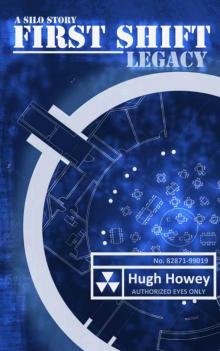 First Shift: Legacy
First Shift: Legacy Wool
Wool Glitch
Glitch Shift
Shift Dust
Dust Molly Fyde and the Land of Light
Molly Fyde and the Land of Light The Shell Collector
The Shell Collector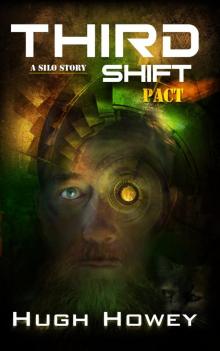 Third Shift: Pact
Third Shift: Pact Molly Fyde and the Fight for Peace
Molly Fyde and the Fight for Peace Sand Omnibus
Sand Omnibus I, Zombie
I, Zombie Second Shift: Order
Second Shift: Order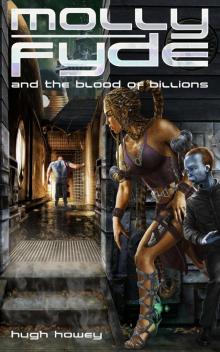 Molly Fyde and the Blood of Billions
Molly Fyde and the Blood of Billions The Hurricane
The Hurricane The Box
The Box Glitch_A Short Story
Glitch_A Short Story Molly Fyde and the Land of Light tbs-2
Molly Fyde and the Land of Light tbs-2 Machine Learning
Machine Learning Resist
Resist Second Shift - Order (Part 7 of the Silo Series) (Wool)
Second Shift - Order (Part 7 of the Silo Series) (Wool)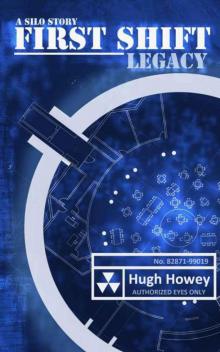 First Shift - Legacy s-1
First Shift - Legacy s-1 Stories on the Go: 101 Very Short Stories by 101 Authors
Stories on the Go: 101 Very Short Stories by 101 Authors Second Shift - Order s-2
Second Shift - Order s-2 The Robot Chronicles
The Robot Chronicles Molly Fyde and the Blood of Billions tbs-3
Molly Fyde and the Blood of Billions tbs-3 Molly Fyde and the Parsona Rescue tbs-1
Molly Fyde and the Parsona Rescue tbs-1 Molly Fyde and the Fight for Peace tbs-4
Molly Fyde and the Fight for Peace tbs-4 Sand
Sand The Walk Up Nameless Ridge (Kindle Single)
The Walk Up Nameless Ridge (Kindle Single) Wool Omnibus Edition (Wool 1 - 5)
Wool Omnibus Edition (Wool 1 - 5) The World of Kurt Vonnegut: Peace in Amber
The World of Kurt Vonnegut: Peace in Amber The Alien Chronicles
The Alien Chronicles Glitch: A Short Story (Kindle Single)
Glitch: A Short Story (Kindle Single) Second Suicide: A Short Story (Kindle Single)
Second Suicide: A Short Story (Kindle Single) Shift (silo)
Shift (silo)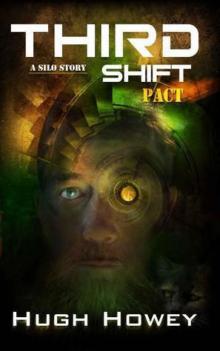 Third Shift - Pact
Third Shift - Pact Dust s-9
Dust s-9 First Shift - Legacy (Part 6 of the Silo Series) (Wool)
First Shift - Legacy (Part 6 of the Silo Series) (Wool)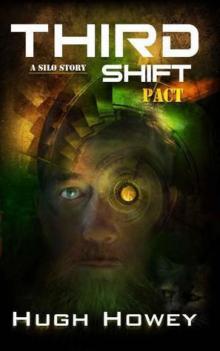 Third Shift - Pact s-3
Third Shift - Pact s-3 Sand: Omnibus Edition
Sand: Omnibus Edition The Box: A Short Story
The Box: A Short Story